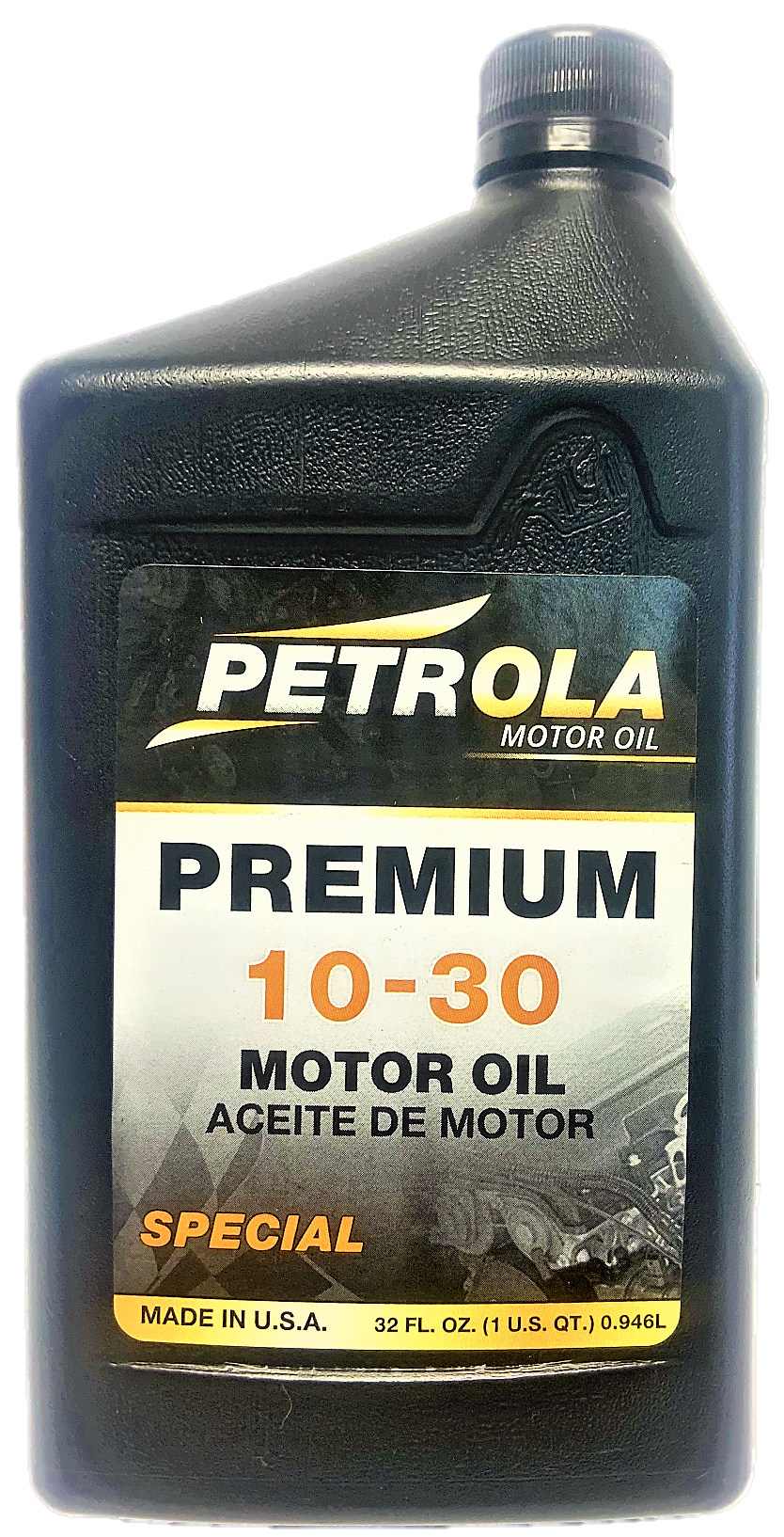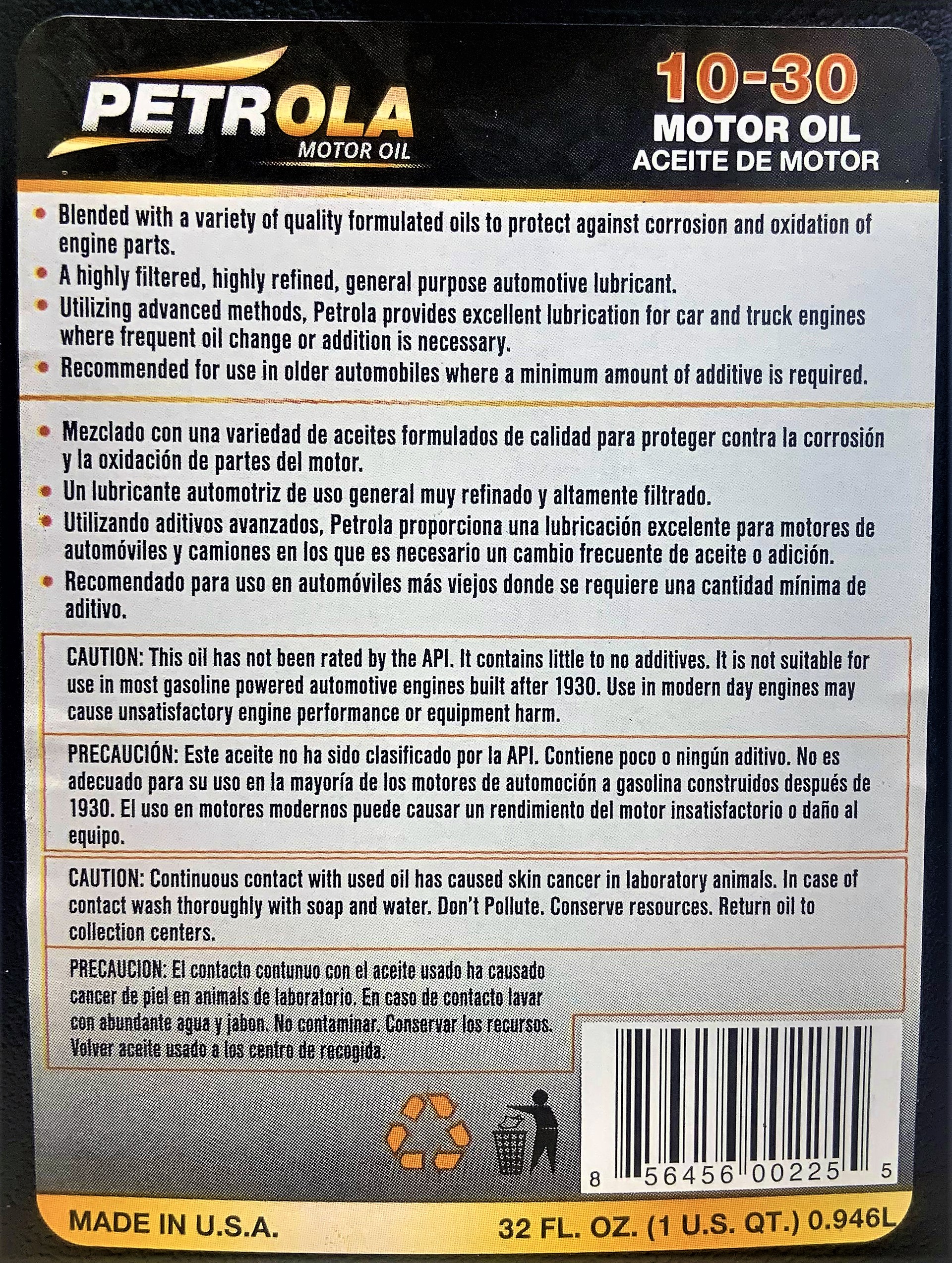Product Tested

Click above for larger image

Click above for larger image
Company and Product Information
Corporate Office:
No Company Information Found
Website(s): No Website(s) Found
Petrola Motor Oil
Premium 10-30 Motor Oil Special
Product: Petrola
Viscosity Grade: "10-30"
Labeled: "This oil has not been rated by the API."
Manufactured By: Unavailable
Purchased at: Youngstown, OH
Date of purchase: 5/14/2019
Website(s): No Website Found
Test Results and Assessment:

The label on the product tested does not comply with the Fair Packaging and Labeling Act (FPLA), or the Uniform Packaging and Labeling Regulations, each of which require the product label to include a declaration of responsibility (name and address of manufacturer, packer, or distributor) of the product.
Whereas the front label of this product boldly displays the word “PREMIUM,” which could be interpreted by a consumer to mean it’s of exceptional quality, the back label includes a cautionary statement saying “This oil has not been rated by the API. It contains little to no additives. It is not suitable for use in most gasoline powered automotive engines built after 1930. Use in modern day engines may cause unsatisfactory engine performance or equipment harm.” Because of this, use of the term “PREMIUM” on the front label is misleading.
The result of the sample tested in fact show that this product contains no meaningful level of additives to protect and engine. Further, test results indicate the product may contain used oil and abrasive material. For these reasons, it is NOT suitable for use in virtually all automobile engines currently on the road and will likely cause harm to an engine if used.
Note: Although the results of the tests conducted on this sample meet the SAE J300 viscosity specifications for an SAE 10W-30 motor oil, the viscosity declaration on the front and back labels of this product do not conform to the SAE J300 labeling requirements and those set forth in NIST Handbook 130 which state the viscosity grade must be preceded by “SAE”.
 |
Physical Properties |  |
||||
| Elemental Analysis |  |
|||||
| Labeling |  |
|||||
|
||||||
Note1: Although laboratory tests alone cannot be used to establish if engine oil meets an API Service Category, they can be used to determine if it doesn't. Note2: The specification for cold cranking viscosity includes only a maximum value; the minimum value shown in the “standard” area of the chart is truncated for illustrative purposes.
| PHYSICAL TESTS (click for test details) - a | Standard | Petrola |
| TBN, mg KOH/g (ASTM D2896) | ||
| Viscosity @ 100ºC, cSt (ASTM D445) | 9.3 to <12.5 | 9.7 |
| Viscosity @40ºC, cSt (ASTM D445) | 59.2 | |
| Viscosity Index (ASTM D2270) | 148 | |
| Viscosity @-25ºC mPa s (cP) (ASTM D5293) | 7,000 Max | 4,153 |
| ELEMENTAL ANALYSIS (click for test details) - a, b | ||
| Additives | ||
| Calcium, ppm | <1 | |
| Magnesium, ppm | <1 | |
| Phosphorus, ppm | 235 | |
| Zinc, ppm | 2 | |
| Molybdenum, ppm | 2 | |
| Barium, ppm | 5 | |
| Boron, ppm | <1 | |
| Silicon, ppm | ||
| Potassium, ppm | 4 | |
| Manganese, ppm | <1 | |
| Titanium, ppm | <1 | |
| Copper, ppm | ||
| Sodium, ppm | 1 | |
| Vanadium, ppm | <1 | |
| Contaminants | ||
| Silver, ppm | <1 | |
| Aluminum, ppm | ||
| Chromium, ppm | <1 | |
| Iron, ppm | ||
| Nickel, ppm | <1 | |
| Lead, ppm | 2 | |
| Antimony, ppm | <1 | |
| Tin, ppm | 1 | |
|
||
